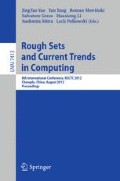Abstract
Traditional rule learners employ equality relations between attributes and values to express decision rules. However, inequality relationships, as supplementary relations to equation, can make up a new function for complex knowledge acquisition. We firstly discuss an extended compensatory model of decision table, and examine how it can simultaneously express both equality and inequality relationships of attributes and values. In order to cope with large-scale compensatory decision table, we propose a scalable inequality rule leaner, which initially compresses the input spaces of attribute value pairs. Example and experimental results show that the proposed learner can generate compact rule sets that maintain higher classification accuracies than equality rule learners.
Access this chapter
Tax calculation will be finalised at checkout
Purchases are for personal use only
Preview
Unable to display preview. Download preview PDF.
References
Skowron, A.: Extracting laws from decision tables: a rough set approach. Computational Intelligence 11(2), 371–388 (2007)
Ruckert, U., De Raedt, L.: An experimental evaluation of simplicity in rule learning. Artificial Intelligence 172(1), 19–28 (2008)
Grzymala-Busse, J., Rzasa, W.: A Local Version of the MLEM2 Algorithm for Rule Induction. Fundamenta Informaticae 100(1), 99–116 (2010)
Wang, G.: Rough Set Based Uncertain Knowledge Expressing and Processing. In: Kuznetsov, S.O., Ślęzak, D., Hepting, D.H., Mirkin, B.G. (eds.) RSFDGrC 2011. LNCS, vol. 6743, pp. 11–18. Springer, Heidelberg (2011)
Janssen, F., Furnkranz, J.: On the quest for optimal rule learning heuristics. Machine Learning 78(3), 343–379 (2010)
Kurgan, L.A., Cios, K.J., Dick, S.: Highly scalable and robust rule learner: Performance evaluation and comparison. IEEE Transactions On Systems Man and Cybernetics 36, 32–53 (2006)
Blaszczynski, J., Slowinski, R., Szelag, M.: Sequential covering rule induction algorithm for variable consistency rough set approaches. Information Sciences (2010)
Pawlak, Z., Skowron, A.: Rough sets and Boolean reasoning. Information Sciences 177(1), 41–73 (2007)
Cios, K.J., Kurgan, L.A.: CLIP4: Hybrid inductive machine learning algorithm that generates inequality rules. Information Sciences 163(1-3), 37–83 (2004)
Liu, Y., Bai, G., Feng, B.: On mining rules that involve inequalities from decision table. In: 7th IEEE International Conference on Cognitive Informatics, pp. 255–260. IEEE (2008)
Yao, Y., Zhou, B., Chen, Y.: Interpreting Low and High Order Rules: A Granular Computing Approach. In: Kryszkiewicz, M., Peters, J.F., Rybiński, H., Skowron, A. (eds.) RSEISP 2007. LNCS (LNAI), vol. 4585, pp. 371–380. Springer, Heidelberg (2007)
Frank, A., Asuncion, A.: UCI machine learning repository (2010), http://archive.ics.uci.edu/ml
Kurgan, L.A., Cios, K.J.: CAIM discretization algorithm. IEEE Transactions on Data and Knowldge Engineering 16(2), 145–153 (2004)
Author information
Authors and Affiliations
Editor information
Editors and Affiliations
Rights and permissions
Copyright information
© 2012 Springer-Verlag Berlin Heidelberg
About this paper
Cite this paper
Liu, Y., Bai, G., Zhou, Q., Rakus-Andersson, E. (2012). Rough Sets Based Inequality Rule Learner for Knowledge Discovery. In: Yao, J., et al. Rough Sets and Current Trends in Computing. RSCTC 2012. Lecture Notes in Computer Science(), vol 7413. Springer, Berlin, Heidelberg. https://doi.org/10.1007/978-3-642-32115-3_11
Download citation
DOI: https://doi.org/10.1007/978-3-642-32115-3_11
Publisher Name: Springer, Berlin, Heidelberg
Print ISBN: 978-3-642-32114-6
Online ISBN: 978-3-642-32115-3
eBook Packages: Computer ScienceComputer Science (R0)

